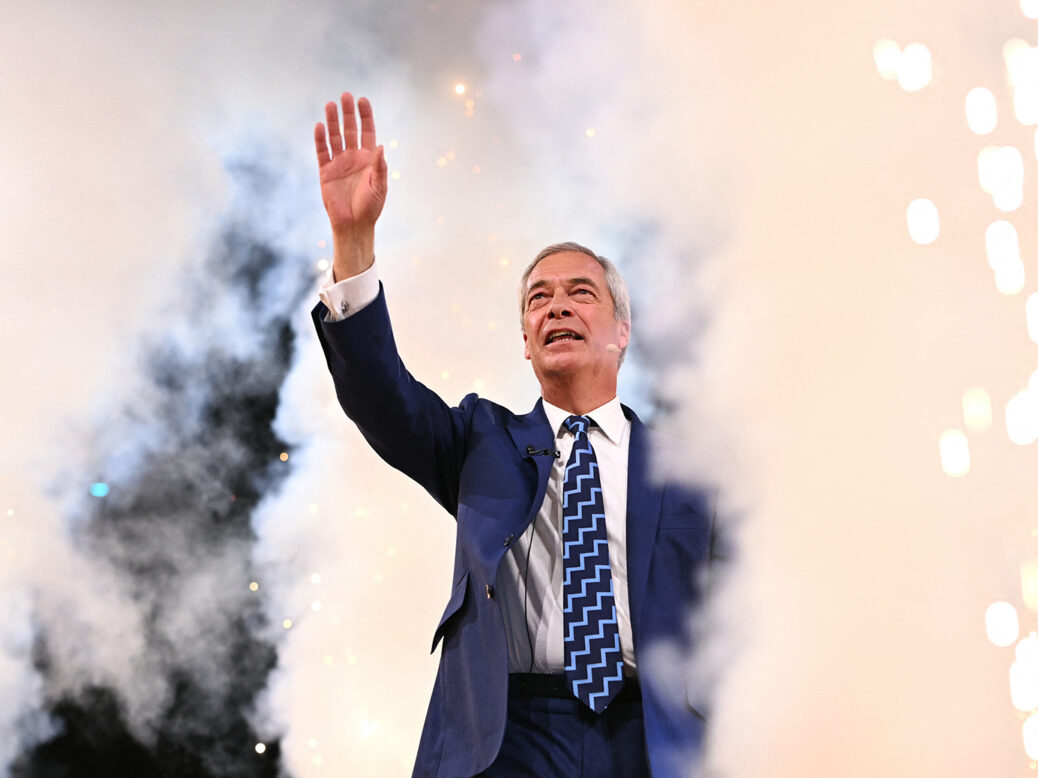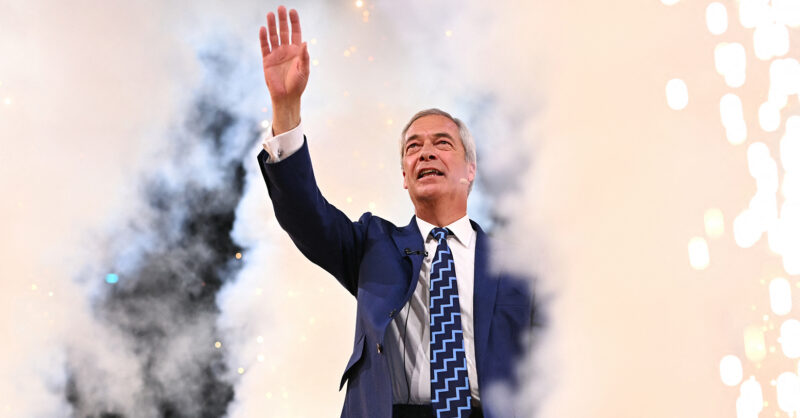
Photo by Oli Sscarff/AFP
They used to say she was the only woman Nigel Farage feared. “At least she’s real,” he conceded in a press conference on 27 May. “She is who she is.” And yet, in his address to Reform Party conference today (5 September), Farage was dancing on Angela Rayner’s political grave.
Farage was due to make his speech at 4pm. But as news of Rayner’s resignation rippled through the Birmingham NEC, word went out that he’d brought it forward to 1pm. By this time the procession of Reform grandees was already in full swing: he followed the Lincolnshire mayor, Andrea Jenkyns, who was wearing a dress so sparkly you’d believe it came with batteries, and who gave a rendition of a thrash metal-y pop song she had apparently co-written called “Insomnia”. Though this conference is more formal than last year’s – more airy, less boozy, and full of sharp-suited lobbyists – Reform still finds room for music-hall froth no other party would ever dare emulate.
Journalists scampered into the auditorium as Farage made his entrance. First, the cube of screens above the stage played an introductory video, filmed and staged like the trailer for a superhero origins movie: Nigel riding a JCB, Nigel grinning and cheering, Nigel walking his dog through wet green meadows. And then, like a turquoise portcullis, a portion of the stage winched into the air, and Farage himself appeared, striding down a catwalk between fizzing pyrotechnics, big beat pounding about his ears.
There was instant and whistling applause. But eventually the crowd settled, knowing what was coming. Then Farage started to give it to them. The “turquoise tide” is rising, he said, on its way to “winning the next general election”. And then he segued: “It’s been a day of some considerable news,” he said, to jeers of laughter. And without mentioning Rayner’s name, he declared that Britain had “a cabinet of wholly unqualified people to run our country”.
He went through the roster, to giggles each time. Rachel Reeves, supposedly a “senior economist at the Bank of England”; the Business Secretary Jonathan Reynolds, who claims to be “a fully qualified solicitor”. And the (now) former Deputy Prime Minister and Housing Secretary: an “accomplished property developer and speculator”. Rayner’s behaviour speaks of an attitude of “entitlement” he went on, proving that Labour is “as bad if not worse than the Tories”.
From here, Farage’s speech returned to his most familiar mode: self-congratulation. He boasted that Reform had fulfilled its expansion plans from its last national conference, opening 450 branches around the country, leading national opinion polls and reaching 240,000 members. And he made sure to snipe at his old party: “The Conservative Party are dead,” he said, quoting Nadine Dorries, who became his latest Tory defector yesterday. At times, his bonhomie even seemed to be aping Dorries’s great hero: I counted two Boris Johnson-esque “folks” scatted through the speech. As he departed the stage, he invited Dorries out to follow him.
Angela Rayner’s resignation today (over her underpaying up to £40,000 in stamp duty) is a gift for a party and a leader who has sought to make himself the voice of professional Britain – and a crisis for Labour. Rayner was widely seen as a rare and genuine working-class voice in the Starmer cabinet, with trade union credentials and a handy vape to prove it. Now, whatever the personal circumstances around her housing situation, to this audience, the vanguard of Middle England, she appears a bluffer, if not a fraud. And she compounds a perception of Labour as detached, monied and self-serving which has haunted this government since the “freebie” scandals of its early days.
Subscribe to The New Statesman today from only £8.99 per month
Her departure only gave further force to the remainder of Farage’s remarks, which focused on the splits in the left. Pointing out that Rayner’s resignation will trigger not only a cabinet reshuffle but a deputy leadership contest in the Labour Party, Farage asked his audience to remember the Labour infighting of the 1980s, and the threat of a challenge from the left. He didn’t name names, but appeared to be referencing Tony Benn’s deputy leadership and leadership challenges in, respectively, 1981 and 1988, which tainted Labour with accusations of a “loony left” insurgency. And this is without mentioning what Farage called the “Jeremy Corbyn sectarian ticket” – the new left breakaway outfit “Your Party”.
Splits at the top of Labour, and splits in its base: with the government and its political identity disintegrating, in the greatest of political ironies, Nigel Farage is able to paint himself as the voice of stability, credibility, even sobriety. As he closed his remarks, Farage told his supporters to prepare for an election as early as 2027, and asked for 5,000 new candidates to stand in the various local and regional contests between then and now. There are 12,000 people at this conference, many who seem eager to answer the call. Whenever the next election will come, it is becoming hard to see any politician who will dare to come between Farage and power.
[See also: Angela Rayner is a victim of Britain’s housing crisis]
Content from our partners


